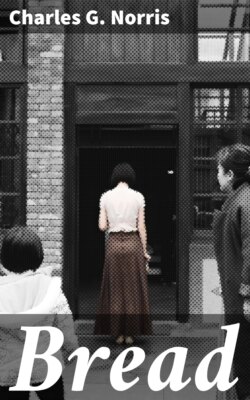Читать книгу Bread - Charles G. Norris - Страница 13
На сайте Литреса книга снята с продажи.
§ 2
ОглавлениеAfter the first few days while she felt herself conspicuous as a new pupil, she began to enjoy herself immensely. The studies fascinated her. Hers was an alert mind and she was unusually intelligent. She had always been regarded as an exceptionally bright student, but she had achieved this reputation with little application. Her school work heretofore had represented merely “lessons” to her; it had never carried any significance. But now she threw herself with all the intensity of her nature upon what seemed to her a vital business. She realized she had only ten weeks in which to master shorthand and typing, and at the end of that time would come the test of her ability to fill a position as stenographer. She dared not risk the humiliation of failure; her pride,—the strongest element in her make-up,—would not permit it. She must work, work, work; she must utilize every hour, every minute of these precious weeks of instruction!
The girl knew in her heart that she had many of the qualifications of a good secretary. She was pretty, she was well-mannered, intelligent, and could speak and write good English. To find ample justification for this estimate, she had but to compare herself with other girls in the school. These for the most part were foreign-born. A large percentage were Jewesses, thick-lipped and large-nosed, with heavy black coils of hair worn over ill-disguised “rats.” Jeannette detected a finer type, but even to these exceptions she felt herself superior. They chewed gum a great deal, and shrieked over their confidences as they ate their lunches out of cardboard boxes at the noon hour. She could not bring herself to associate with such girls, and forestalled any approach to friendliness on their part by choosing a remote corner to devote the leisure minutes to study. In consequence she became the butt of much of their silly laughter, and though she winced at these whisperings and jibes, she never betrayed annoyance. There was a sprinkling of men and boys throughout the school, but the male element was made up of middle-aged dullards and pimply-necked raw youths, none of whom interested her.
The weeks fled by, and Jeannette was carried along on an undiminished wave of excitement. Everything she coveted most in the world depended upon her winning a diploma from the school at the end of the ten weeks’ instruction. She discovered soon after her enrollment, that while this might be physically possible, it was rarely accomplished, and most of her fellow students had been attending the school for months. A diploma represented to her the measure of success, and as the time grew shorter before she was to take the final examinations, she could hardly sleep from the intensity of her emotions.
At home, matters had materially improved. The epidemic was over; Miss Loughborough’s school had reopened its doors, and Mrs. Sturgis was again beginning to fill her Wednesdays and Saturdays with lessons. But the problem of finances was still unsolved. There was a loan of five hundred dollars now on the insurance policy, and Jeannette foresaw her mother would not cease to fret and worry over that until it had somehow been paid back. Everything, it seemed to her, depended on her success at school. There was no hope for the little family otherwise. Alice—trusting, complacent little Alice—was not the type who could shoulder any of the burden; her mother was perceptibly not as strong as she had been. There would always be debts, there would always be worry, there would always be skimping and self-denial, unless she, Jeannette, got a job and went to work.
Weary with fatigue, she would drive herself at her practice on the rented typewriter in the studio every evening until her back flamed with fire and her fingertips grew sore. She made Alice read aloud to her while she filled page after page in her note-book with her hooks and dashes, until her sister drooped with sleep. Mrs. Sturgis protested, actually cried a little. The child was killing herself to no purpose! There wasn’t any sense in working so hard! She was wasting her time and it would end by their having a doctor!
Jeannette shook her head and held her peace, but when the reward came and old Roger Mason, who had been principal of the school for nearly twenty years, sent for her and told her he wanted to congratulate her on the excellent showing she had made, she felt amply compensated. But none of those who eagerly congratulated her,—not even her mother nor Alice,—suspected how infinitely harder than mastering her lessons had been what she had endured from the jeering, mimicking girls who had made fun of her through the dreadful ten weeks.
But that was all behind her now. She could forget it. She had justified herself, and stood ready to prove to her mother and sister that she could now fill a position as a regular stenographer, could hold it, and moreover bring them material help. She was all eagerness to begin,—frightened at the prospect, yet confident of success.
